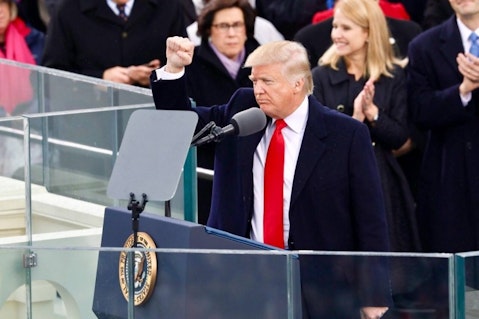At the end of May, U.S President Trump announced tariffs on the steel (25%) and aluminum (10%) imports coming from fellow NAFTA members Canada and Mexico, as well as the European Union, which went into effect at the end of last week.
The move followed aluminum imports soaring by 33% over the past two years to record highs, putting pressure on American aluminum producers as cheap aluminum flooded the U.S market. Trump also described the issue as one of national security, as only one U.S aluminum smelter remains operational that can make high-purity aluminum, which is needed in the construction of fighter jets. Overall, just five aluminum smelters remain operational in the U.S, down from 23 in 1995.
Unsurprisingly, companies that use steel and aluminum in their products have not been overly supportive of the tariffs, which could disrupt their supply chains and raise costs. Furthermore, retaliatory tariffs could further exacerbate the issue by making their exports less attractive overseas.
The U.S aluminum industry in particular could be harmed more than helped by the tariffs, as the vast majority of jobs in the industry (97%) are in downstream positions compared to just 3% in the smelting positions that could be slightly revitalized. The U.S also imports far more aluminum (90%) to meet its needs than it does steel (30%), with Canada being the largest aluminum exporter to the U.S.
In this article, we’ll take a look at five stocks that will be affected by higher steel and aluminum costs, as well as by some of the retaliatory tariffs that have already been fired off in response to those taxes.
Molson Coors Brewing Co (NYSE:TAP) & Anheuser Busch Inbev NV (ADR) (NYSE:BUD)
The beer makers figure to be two of the companies most heavily impacted by the tariffs on aluminum, which is increasingly used in the production of beer cans. Molson Coors estimates that aluminum accounts for 66% of its packaging costs, purchasing 500 million pounds of it annually, and that $40 million in profit could be wiped out by the increased costs.
Both companies have warned that the tariffs could lead to job losses in the industry, with Anheuser Busch Inbev NV (ADR) (NYSE:BUD) warning on Twitter that a 10% aluminum tariff would threaten 20,000 manufacturing jobs in the industry, while Molson Coors stated that job losses in the industry were “likely”. U.S. Beer Institute CEO Jim McGreevy went so far as to call the tariffs a new tax on the beer industry.
Molson Coors Brewing Co (NYSE:TAP) shares are down by 17% this year, though they’ve rallied since the beginning of the month, while Anheuser Busch Inbev NV (ADR) (NYSE:BUD) shares are down by 14%. Hedge funds were not overly confident in either stock heading into 2018, as just 24 were shareholders of Molson Coors on December 31, down from 31 three months early. During that same period, hedge fund ownership of Anheuser Busch dropped to 27 from 30.
We track hedge fund activity to uncover actionable patterns and profit from them, as our flagship “Best Performing Hedge Funds Strategy” has done exceptionally well. This strategy, which invests in the consensus picks of the top 100 best performing hedge funds every quarter, has returned 87.8% vs. 53.3% for the SPY. You can see our latest picks by trying our newsletters free of charge for 14 days.
Follow Molson Coors Beverage Co (NYSE:TAP)
Follow Molson Coors Beverage Co (NYSE:TAP)
Receive real-time insider trading and news alerts
On the next page we’ll look at three other companies that will be impacted by rising steel and aluminum prices.
General Electric Company (NYSE:GE)
About the last thing embattled GE needed was more operational challenges, yet that’s precisely what the tariffs have thrust upon it. The company uses aluminum and steel to manufacture a wide-range of products, from heavy machinery to jet engines.
Somewhat surprisingly, General Electric Company (NYSE:GE) has claimed that the impact of the tariffs will be “minimal” and that earlier reports concerning the potential impact on its costs were “completely unfounded”. The company seemed to reach this conclusion by only looking at the amount of imported metals that it uses which would be affected, seemingly ignoring the reality that even domestic prices will rise because of the tariffs. That has clearly been the case over the past five months, as domestic HRC and CRC steel prices have jumped by nearly 50%.
General Electric Company (NYSE:GE), whose shares are down by 27% this year and which was recently removed from the Dow Jones, could also face added challenges in unloading some of its assets, including its rail business, due to the rising costs of running that business. The company is also extremely susceptible to counter-tariffs, doing the majority of its business overseas.
Follow General Electric Co (NYSE:GE)
Follow General Electric Co (NYSE:GE)
Receive real-time insider trading and news alerts
Harley-Davidson Inc (NYSE:HOG)
Harley-Davidson Inc (NYSE:HOG) appears to be in danger of suffering both domestically and internationally from the tariffs, with its shares being down by 14% in 2018 as a result. Not only will the motorcycle maker be affected by rising steel and aluminum prices, with costs rising by as much as $20 million this year according to the company, but the E.U has taken direct aim at Harley-Davidson in its counter-tariffs.
Europe, which accounts for about 16% of Harley-Davidson’s sales, included big motorcycles in its list of U.S products that will be hit with tariffs in retaliation for the U.S tariffs on steel and aluminum. Harley-Davidson has stated that such tariffs would have a significant impact on the company’s sales, at a time when its sales and profit are already slumping.
Follow Harley-Davidson Inc. (NYSE:HOG)
Follow Harley-Davidson Inc. (NYSE:HOG)
Receive real-time insider trading and news alerts
Campbell Soup Company (NYSE:CPB)
Campbell Soup Company (NYSE:CPB), shares of which have slumped by 22% this year, stated during its conference call last month that the tariffs could pinch the company’s margins in 2018. Campbell’s warned that the cost of tin plate steel, which the company uses to craft its many soup cans, would be forced higher due to insufficient supply being available solely from U.S steel producers. In rebuttal, Commerce Secretary Wilbur Ross claimed that Campbell’s soup cans use just $0.026 worth of steel, making the impact of the steel tariffs less than a cent per can. Nonetheless, even less than one cent still adds up when you’re selling hundreds of millions of cans annually.
Campbell Soup Company (NYSE:CPB) was likely eager to jump on any possible excuse for its future performance, as its past performance has left much to be desired, which culminated in CEO Denise Morrison stepping down recently after a rather unsuccessful seven years as the soup company’s leader.
Follow Campbell's Co (NASDAQ:CPB)
Follow Campbell's Co (NASDAQ:CPB)
Receive real-time insider trading and news alerts
Disclosure: None






